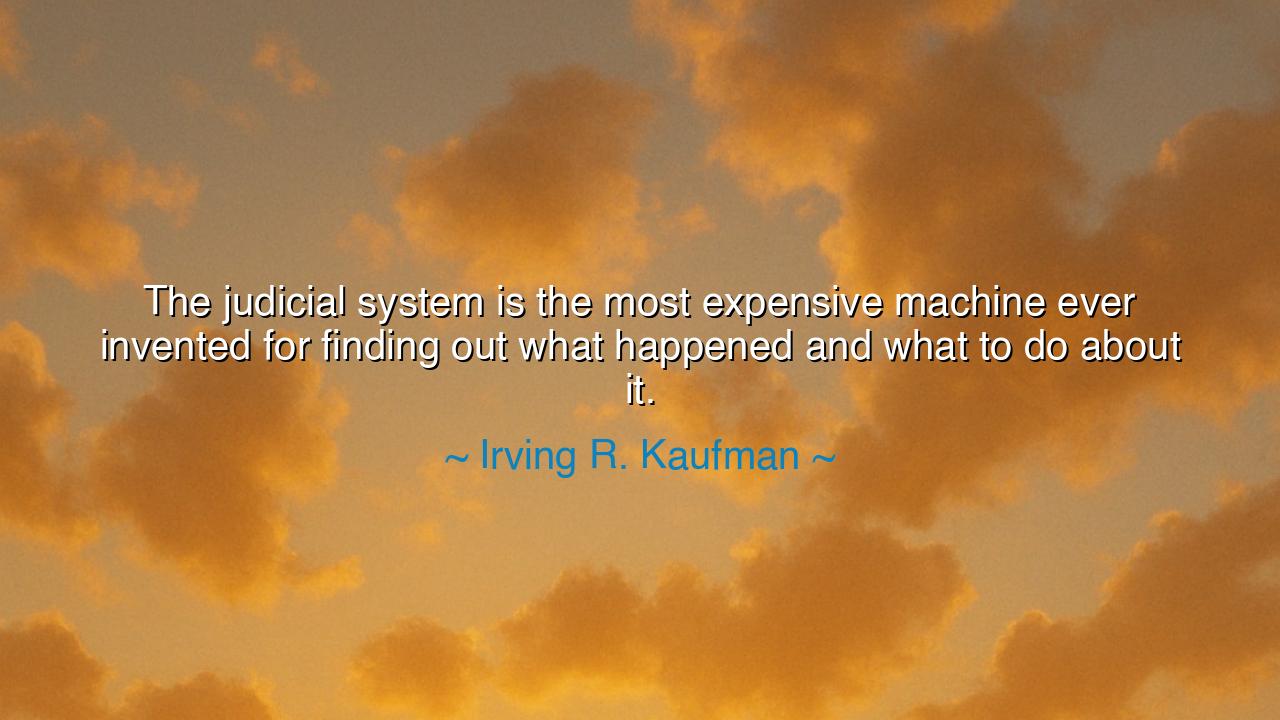
The judicial system is the most expensive machine ever invented
The judicial system is the most expensive machine ever invented for finding out what happened and what to do about it.






In the discerning and reflective words of Judge Irving R. Kaufman, we are presented with a truth both profound and humbling: “The judicial system is the most expensive machine ever invented for finding out what happened and what to do about it.” These words reveal both reverence and lament for the law—a recognition that the pursuit of justice, while noble in its aim, is often burdened by complexity, cost, and human imperfection. Kaufman, who devoted his life to the cause of justice, spoke not as a cynic but as a realist, acknowledging that even the most sacred institutions of man are wrought with struggle. His quote reminds us that the law is not divine—it is human, and thus, it carries the weight of our frailty as well as our faith.
The origin of this quote lies in Kaufman’s reflections as a federal judge, one who presided over some of the most consequential cases in American history, including the trial of Julius and Ethel Rosenberg, accused of espionage during the Cold War. Through years upon the bench, he witnessed the immense machinery of the courts—the judges, the lawyers, the clerks, the juries, the endless files and proceedings—all laboring toward a single goal: to discern the truth. Yet Kaufman saw that this machine, though created to uphold justice, required enormous time, wealth, and human energy to operate. It was, in his words, the most “expensive” machine not merely in dollars, but in the emotional and moral cost demanded of those who pass through it.
To call the judicial system a machine is to recognize both its strength and its tragedy. Like a great engine, it is designed to move forward with precision and purpose. But unlike a clockwork, it is powered not by gears alone, but by human judgment—flawed, passionate, and uncertain. The court seeks to uncover truth, yet truth itself is often veiled in perception and memory. Witnesses forget, evidence deceives, motives hide in shadows. The judicial system, then, is not a temple of perfect clarity—it is a forge, where truth is hammered out by argument and reason, trial and error. And this forging, as Kaufman knew, is never cheap. It consumes time, treasure, and the faith of all who seek its verdict.
Consider the tale of the Dreyfus Affair in France, at the dawn of the twentieth century—a story of justice betrayed and later redeemed. Captain Alfred Dreyfus, a Jewish officer in the French army, was falsely accused of treason. The courts condemned him, driven not by truth but by prejudice. It took years of appeals, investigations, and the courage of men like Émile Zola, who cried “J’Accuse!” before the world, to reveal the injustice. In the end, Dreyfus was exonerated—but only after a nation’s soul had been tested. That is what Kaufman’s words mean: that the pursuit of justice demands immense sacrifice, and that sometimes, the machinery meant to protect truth must first destroy illusion.
Yet Kaufman’s observation is not despairing—it is instructive. He saw that the imperfections of the judicial system do not render it worthless; rather, they reveal the price of civilization. For a society that values justice must be willing to bear its cost. It must fund its courts, train its lawyers, and nurture its judges with integrity. It must accept that truth cannot be summoned swiftly, nor cheaply. The alternative—mob rule, vengeance, or tyranny—costs far more. Thus, while the law may grind slowly, it grinds toward something higher than vengeance: it grinds toward order, fairness, and peace.
Kaufman’s words also remind us that justice is not the task of judges alone. Every citizen participates in the great machine—through jury duty, through civic engagement, through respect for truth. The judicial system reflects the values of those who sustain it. If corruption seeps into its gears, it is because we have neglected our duty to keep it clean. If injustice prevails, it is because we have grown weary of the labor of truth. The courts, like any tool of civilization, are mirrors of the souls that built them.
So, my children, learn from the wisdom of this judge. Honor the cost of justice, but never take it for granted. Speak truthfully, for truth is the oil that keeps the machine running. Seek fairness, for fairness is the balance that prevents it from breaking. Do not scorn the law when it falters—strengthen it, and remember that its imperfections are the measure of our humanity. The pursuit of justice will always be costly, but it is a cost we must pay, for in its payment lies the preservation of freedom itself.
In the end, Kaufman’s words remind us that the law, for all its weight and wear, is the grandest invention of human reason—a machine built not to destroy, but to discern; not to enslave, but to enlighten. And though it may be slow, costly, and flawed, it remains our finest attempt to answer the eternal question: what is right, and how shall we live by it?






AAdministratorAdministrator
Welcome, honored guests. Please leave a comment, we will respond soon